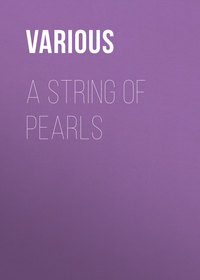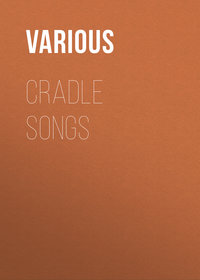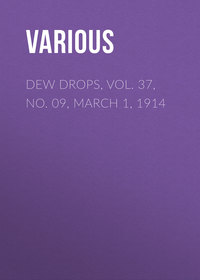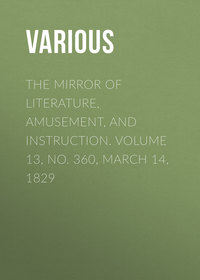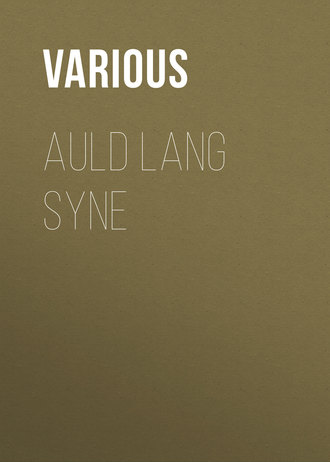
Auld Lang Syne
But a trial had to come upon the anchor-devil and its worshippers. Under it it must collapse, or passing through it as through the flame of persecution, come forth stronger and brighter than ever. Which should it be? It was an interesting spectacle. Let me finish my story.
There returned to Koussa Kaffir a native who had voyaged round the world since he had left his native land; he had seen and had observed much; he was well acquainted with anchors; had seen them in all stages and under all conditions; he knew their use by long experience; he had handled them. One time his vessel had been saved by its stout anchor, another time he had had to save the ship by slipping his cable and leaving the anchor at the bottom; he had never known an anchor resent the worst usage; he would not worship this old broken one. Some thought him mad, some wicked; he was called infidel by those who knew his mind, but for a long time he followed his friends’ advice, and said nothing of his awful heresy.
But this condition of mind would hardly last for ever. Travel had improved his intellectual force, as well as given special knowledge about anchors and other things; he began to lament over and even to despise the folly of his race; he burned to cast off some at least of their shackles of ignorance and superstition. “How shall I begin,” cried he one day, “to raise their souls to something higher, while they worship that stupid old rusty anchor in the sand?”
His soul began to burn with the spirit of martyrs and reformers. “I will expose this folly; I will break to pieces their anchor-devil, and when they see that all is well as it was before, they will begin to laugh at their own devil, and will have their minds open to a higher faith.”
But first he would consult his friends; if possible obtain their sanction, and act in unison with others. He met with no encouragement. One gravely rebuked him for his presumption and conceit, and produced a long list of eminent Kaffirs who had bowed before the anchor. Another found in the absurdity of the anchor faith its best evidence of solidity. It was, he said, a faith too improbable for a Kaffir to have invented; any fool, he added, could believe a probable religion, but it needed a superior Kaffir to swallow this. Some put their tongues in their cheeks (a vulgar habit amongst the Koussa Kaffirs), and said: “Silly fellow, we know all that as well as you do, but the anchor is a profitable anchor, and as needs must, you shall be one amongst the priests.”
Again, others said: “We, too, have our doubts, but as a political engine we must retain our anchor. How should we keep down the lower orders? How restrain our servants from pilfering without its influence and sanctifying power? The fact is, that in our complicated social system all society depends upon the anchor.” “Between ourselves,” one added, “if heaven had not sent that particular anchor some of us think we must have sent to Woolwich for another.”
But the only arguments that caused him any hesitation, and which did give him some pain, were from certain women who implored him not to destroy their anchor idol. “We cannot judge,” said one of these, “between your arguments and the conclusions we have been brought up to reverence. The anchor may not be a god but only a symbol, but how beautiful a one! Does not the anchor save the ship? And are not our own lives, too, like the storm-tossed vessel? That anchor is associated with all we have felt, suffered, prayed for. Destroy that symbol, and you wound and endanger the deepest element of religion in our hearts.”
Finally, one very intelligent friend said to him with much solemnity: “Rash man, forbear! Stop while there is time in a course that may bring down ruin on the State and on yourself, and for the doing of which you can have, as a rational being, no temptation whatever. I grant you you may be right, and the rest all wrong; but what then? We can know nothing of the matter, and you may be wrong. Now, anyhow, we are on the safe side of the hedge. If the anchor be a devil he may do you harm, and if he be only a bit of rusty iron, you will be none the worse for a bow and a grimace.”
The rash man was immovable. Doomed by the infernal gods to pay the penalty of having lit his Promethean torch at Woolwich dockyard, armed with a mighty hammer, and followed by an awe-struck crowd, he fell upon the anchor, and with one mighty blow, struck off the other fluke. It was his last! Inspired by religious zeal, the Koussa Kaffirs rushed upon him, and in the sight of the outraged anchor beat his brains out on the beach. It was observed that his friend who liked to be “on the safe side” threw the first stone, and the advocate of public morals was the next; after that they rained too thick to tell who did the most.
Meantime the anchor of Koussa Kaffir will be worshipped for a thousand years, for has it not slain the only two men who dared to question its authority?
REALITIES;
A DRAMA IN FIVE ACTS
[Ye Prologue.]I HAD been to the theatre, swallowed a play,Seen bright Marie Wilton, and cried with the bestO’er the poor parting lovers; then laugh’d and was gayAt the plump roly-poly, the puns, and the rest.[Acte ye fyrste.]So into the streets, warmly muffled, I came,And turn’d my steps homeward, three miles in the fog;When, threading a court (I can’t tell you its name),I tripp’d against something I thought was a dog,For it moan’d. I stoop’d down, half-expecting a bite;But the thing never moved; then I look’d, and behold,A baby, wrapt up in brown paper and night,Half-dying with hunger, half-frozen with cold.I return’d to the Foundling, and ringing the bell,Gave Baby in charge; then, retracing my way,I mused upon this which had happen’d, and fellFrom my comedy-mood to a tragedy-play.[Acte ye second.]I had seen the first act – now the second began.Night lifted her curtain; and, here in the street,A minute City Arab, the least of his clan,Patter’d past on the pavement, – no shoes to his feet;Black, shivering, starving; not daring to beg,Not able to work, not unwilling to steal,If a chance came his way; he was fleet of his leg;He would risk a policeman to pilfer a meal.Sure enough the chance came; ’twas a truckful of bread;No Gorgon to watch it – no dragon to slay;Like a juvenile Jason, he plunder’d and fled;Like a Jason, he found a Medea to pay —In the shape of a lout, twice the size of himself,The sole witness, by hunger made ruthless and keen;He demolish’d the pilferer, pilfer’d the pelf,Disappear’d with his booty – and down came the scene.[Acte ye thyrde.]Act the third was a garret; – I thought I had clombUp a hundred of stairs, to a hole in the roof,Where a lad of eighteen had made shift of a home, —With a wife, if you please – and a baby for proof.He was thief by profession – a cadger – a sot —Sticking close to his calling; and so, as we say,An habitual rogue; – had he chosen his lot,It may be he had pitch’d on an honester way.As it was, he was light of his fingers – adeptAt shop-lifting and burglary – nimble and cute;Never fear’d a policeman (unless when he slept),And was held by his pals in the highest repute.[Acte ye fovrthe.]Act the fourth is the hulks, where our hero appearsIn the proper stage garments of yellow and red;With a chain to his leg this last dozen of years,And a warder to see that he works for his bread.[Morall Reflecciouns.]Once again – ’tis his lot; you won’t hear him complain;He was born to it, kick’d to it – Fortune is blind;And if some have the pleasure, some must have the pain;So it’s each for himself – and the devil behind.[ Acte ye last and Ingenious rhyme.]The last act of our drama – well, what shall it be?The august British Public, defraying the cost? —Or.. P-a-r-l-i-a-m-e-n-t?Or the angels, lamenting the soul that is lost?BARK
BOW-WOW!
I’m my master’s dog; whose dog are you? I live in a kennel, which somebody was good enough to make for me; and I sleep on straw, which grew that I might sleep on it. I have my meals brought to me punctually; and, therefore, I conclude that meals are a noble institution and that punctuality is a virtue. When I act as a good dog ought to act, I get a bone, and my master pats me on the back. Therefore I always do what is expected of me; and that I call morality. Dogs which have no kennels flounder about in the gutter. Having a kennel, I eschew the gutter; – and that I call respectability. It is in the nature of dogs to lick their masters’ feet. The best dogs do it, so I follow their example; – and that I call religion. If I do what is not expected of me, I get the stick. I do not like the stick, so I behave myself; – and that I call conventionality. There is a chain round my neck, lest I should run away. I cannot break the chain, so I play with it; – and that I call the proper subjection of the individual. But I am free to pull at my chain till my neck is sore; – and that I call liberty.. For the rest, I bark.
There are three kinds of spiritual beings: men, dogs, and cats. Men are supreme, and made both dogs and cats. Dogs were created for happiness, and cats for misery. We are the good race, and they are the evil. It is the duty of a dog to kill a cat. Then hate cats, and hang them up by the tails in the back garden. If I am a bad dog, I shall be turned into a cat, and hung up by my tail. Cats are fed on black beetles; but men are very happy, and eat bones all day long. I eat a bone when I can get one; which makes me think that I shall some day be turned into a man. When I am, I shall hang up cats by the tails.
Of created beings dogs are the only ones who have souls. There is a heaven for dogs, but for no one else. There are no cats in heaven; and for that matter, very few dogs; but I hope to be one of them; for there the dogs have meaty bones, and bark all day long, making sweet music. This is the Dogs’ creed. All who believe it will go to Bone-land; and all who do not, will be hung up with the cats in the back garden.
Bow-wow!
SMOKE.
THE IRONWORKERS
Under the rolling smoke, the brave black smoke,Our work is wrought;Fashion’d strong with every sturdy strokeThat does wild music from the roofs provokeIn echoes brought.A rare bold sportRather than labour stern, or blunting task;A toil to askNot blench from. Merrily round the fireWe work our will,Producing stillSome new form daily to our hearts’ desire.Delicate iron bandsThat, as with fairy hands,Heavenward aspireTo carry roofs, sun pierced and ever gleaming,Wherein the varied raceOf fruit or flowers finds place,While the weak Northern rays through mist are streaming.Or lofty gateOf palace or of temple set apart;The hallowed gaols of art,Where low estateIs never welcome; ever warmly biddenTo enter and abide. Far better hiddenLife’s earnest prime behind the factory gate.Always the rolling smoke, the brave black smoke,Is overhead,Like floating incense looming through the sky,It tells the prayer of work goes on hard byWhere zeal new energies of life evokes;While iron redFrom earthy bedBlackens to use beneath the smith’s firm strokes.Under the rolling smoke, the brave black smoke,Our lot is laid.Our ever-flaming altar spreads on highThis great scroll as a witness in the skyOf effort made.Here, rare workmanship, we, day by day,Strive to display,Not heeding if our work make weal or woe.We do our best,Ye will the rest,To meet whose wants me make our furnace glow.Pleasant are our rough handsThat work the world’s demandsAnd never tire,Bringing to shape forms past the quaintest dreaming.Hot, and with grimy armsWe weave the Earth’s new charms,Only a hymn of praise our toil esteeming.Under the rolling smoke, the brave black smoke,Our work is wrought;Not a cloud, the summer air to choke,But banner of our craft, the floating smokeEnsigns our labour, with bright meanings fraught.WHEREFORE HORRIBLE SPRING?
From Béranger
When winter was here, from my window on highI saw her sweet face up at hers where she sat.We never had met, but ’twas plain she and IFrom falling in love were not hinder’d by that.Between the bare boughs of these lindens how oftKind kisses we blew I’ve no patience to sing,For there are the leaves now all quiv’ring aloft —Ah! why are you here again, horrible Spring?Yes, there are the leaves, and no more I beholdMy kind little neighbour put forth her dear headTo scatter the bread-crumbs, when, tamed by the cold,The robins, her pensioners, wait to be fed.The minute her casement she open would throw,The Loves with our errands were all on the wing.What is there for beauty to equal the snow?Ah! why are you here again, horrible Spring?And ’twere not for you I should still with the dawnBehold her new-risen in simplest array;So, radiant and lovely, great painters have drawnAurora enclosing the curtains of day.At eve, in the heavens though stars might be bright,I watched for her taper my planet to bring;How lonely I felt when she put out her light;Ah! why are you here again, horrible Spring?Ever dear to my heart must the winter remain;How glad I should be if I only could hearThe sharp little tinkling of sleet on the pane,Than whispering of zephyrs more dulcet and dear.Your fruits and your flowers are odious and vile,Your long sunny days only sadness can bring;More sunny by far was the light of her smile.Ah! why are you here again, horrible Spring?VOICES
Through hoary centuries, through History’s page,Like tongues of fire unquench’d, undimm’d by age,Whisper the voices, living, clear and true,The crust of Time and changes piercing through;Sometimes like trumpets’ martial tones they ring —Anon, scarce heard, in trembling accents sing,Yet there is life in what they tell and say,A life nor years nor days can sweep away:From out the Past, from out the silent grave,From the lone deep where beats the ceaseless wave,They yearn, they rise, they plead with deathless tone:From hill, from field, from cot, from kingly throneThey bring their witness; – if we list or learn,The days shall tell of each one in his turn: —Oh, who shall say a voice, however weak,Its message doth not bear – its lesson speak!THE RETURN OF THE SWALLOW.
THREE VOICES
The Child speaksTweet, tweet, tweet!The birds cry out of the sky.Tweet, tweet, tweet,Mother I want to fly.Up, and up, and up,Above the poplars tall,Mother, if I had wings,I would fly and never fall!The Mother speaksSweet, sweet, sweet!So the swallows are here again,Flying over the village street,And out to the open plain.Sweet, sweet, sweet!As they cried three springs ago,When Will led me through the fieldsDown to the church below.Three years have come and gone,Through warm summer and winter coldI have carried his dinner afield,And led the cattle to fold.Three years have come and gone,And my child is just two years old,And the swallows are crying again Sweet, sweet,And my tale is told.The Grandmother speaksFleet, fleet, fleet,Are those the swallows I hear?The sound was sudden and sweet,And this is the spring of the year.To my dim eyes they seemBut a sudden light as they pass;But I know how they skim o’er the stream,And over the churchyard grass.Their wings are a sudden light,Thy tunes will not be long,For my spirit is nearer its flightThan that of the young and the strong;Fleet, fleet, fleet, my days are waning fast,I hear them cry, for out of the sky,“There are wings for the soul at last.”SWALLOWS
A NEW season is begun. Parliament met to-day. London is getting full, and the price of coals has fallen. The celandine (swallow-flower) is beginning to cover the hedgerow banks of the Isle of Wight with yellow stars, and the swallows themselves will soon be with us again.
I may mention as another agreeable sign of spring the return of “Pen and Pencil,” not to the old nest, but under shelter of the old hospitality.
The Rhodians used to salute the return of the swallows with a traditional popular song, the Chelidonisma; perhaps some lady present may gratify us with a chant of the like purport. My own aim this evening is merely to give some brief natural history notes on the British swallows, drawn partly from books and partly from my own observation.
There are about sixty species of the family of Hirundinidæ, but only four kinds (counting the swift as one) are habitual visitors of the British Islands – the chimney swallow, the house martin, the bank martin (Hirundo rustica, urbica, and riparia), and fourthly the swift (Cypselus).
The chimney swallow (rustica) has a brownish-red throat, back of blue-black lustre, under part of body reddish-white, and a long forked tail. It is a bold bird, and trusting to its superior speed, dashes at a hawk whenever it sees one. It always builds near men, and makes its cup-shaped nest inside chimneys and old wells, in barns, gateways, sheds, and arches of bridges. There are four or five spotted eggs, and it brings out two broods each year. The chimney swallow has a sweet little song of its own, and is one of the earliest birds heard of a summer morning, beginning soon after two o’clock. It is said to grow very tame in confinement, but I never saw and should not like to see one in a cage. These are the most abundant of our swallows, and the same birds return year after year, while their little time endures, to the same localities, and often very likely to the same nests.
The house martin (urbica), or window swallow or martlet, is smaller and less agile than its cousin just described, and has a far shorter tail. Its feet and toes are downy. It comes later than the chimney swallow, builds amidst towns, on the outside of houses, under eaves and in window niches, and chooses a northern aspect to avoid the direct rays of the sun, which would crack its mud nest. Martlets sometimes build on the face of cliffs, as may be seen at the Giant’s Causeway. It has four or five white eggs, and brings out two broods. As a vocalist it can only get as far as a chirp, or at most a small twitter. Its body is white below, and purple on the back and wings. The house martin does not, like the chimney swallow, sweep the ground and water in its flight.
The bank swallow (riparian) or sand martin, which is so sociable with its own kind but not with man, digs horizontal and serpentine holes in banks, sloping upwards to avoid rain, where it lays in a careless nest four or six white eggs. It has sometimes, but perhaps not always, two broods. These are the smallest and wildest of our swallows; nearly mute, or with only a tiny chirp; and, when they can, frequent large spaces of water. They often fly waveringly with a quick fluttering of wings, somewhat like butterflies, and anon sail circling like other swallows. They use their old caves for some years, but may often be seen digging new ones. They are probably driven out sometimes by the fleas which, as I have often seen, abound in their habitations. Birds, indeed, free and airy as their life seems, suffer much from vermin, and the poor baby swallows are terribly preyed upon. The sand martin is mouse-coloured on the back and brownish-white below. It is the earliest to arrive in England, and may be expected now in three weeks or so. Next we may look for the chimney swallow with his long tail – then for the house martin, and latest of all comes the swift (Cypselus), which some naturalists say is no true swallow, having several anatomical peculiarities, the most noticeable being that all four toes go forward. No other bird, I think (save the Gibraltar swift), has a similar foot. The swift can cling well to the face of a wall, but cannot perch in the usual bird fashion, and gets on very badly on the ground, finding it difficult to rise on the wing. Once in the air, with its long wings in motion, it is truly master of the situation. It is one of the speediest, if not the speediest, and can keep on the wing for sixteen hours, which is longer than any other bird. The swifts are most active in sultry thundery weather. They fly in rain, but dislike wind. They are the latest day-birds in summer, and their one very shrill note may be heard up to nearly nine o’clock. Sometimes they get excited and dart about screaming, perhaps quarrelling, but usually the swallows, all of them, agree well among themselves, though they also keep a proper distance. The swifts build high in holes of walls and rocks. The Tower of London is one of their London palaces. The nest is bulky and has two white eggs. There is but one brood in the season, and the swift leaves town for Africa in August, going earliest, although he was the latest to come.
Swallows for several weeks after their arrival in England play about before beginning their nests —
“Like children coursing every room
Of some new house.”
They wait for fit weather to go away, and may then be seen sitting in rows as though meditating on their journey, perhaps dimly sorry to part —
“With a birdish trouble, half-perplexed.”
Utterly mysterious and inscrutable to us are the feelings of our lower fellow-creatures on this earth, and how the bird of passage, “lone-wandering but not lost,” finds its distant goal, is beyond man’s wit to explain.
After this I fear tedious sketch of our four winged friends, I will only add another word or two as to the name swallow, a rather odd word, entirely different from the Greek χελῖδών, and the Latin hirundo (which, unlike as it may appear, philologists tell us is formed from the Greek name). The Italians call the bird rondine (evidently from the Latin), and the French hirondelle. We get our word from the Anglo-Saxon, swalewe, and the modern German is schwalbe. What does this mean? I must own with regret that it seems to me most likely that the name is given on account of the voracity of this bird, which is engaged in swallowing gnats, beetles, bees, may-flies, dragon-flies, and all kinds of flies from break of day till sunset. The Anglo-Saxon verb to swallow is swelgan. Fain would I take the word swelgel, air, sky; but the Spanish name for our bird seems conclusive for the baser derivation. The Spaniards call it golondrina (evidently from gola, throat); and it may be added, make a cruel kind of amusement out of the gulosity of the swallows, by angling for them with fishing-flies from the walls of the Alhambra, round which the birds dart in myriads on a summer’s day – descendants of those that played round the heads of the Moorish kings, who perhaps were kinder to their visitors.
THE RETURN OF THE SWALLOWS
“Out in the meadows the young grass springs, Shivering with sap,” said the larks, “and weShoot into air with our strong young wings, Spirally up over level and lea;Come, O Swallows, and fly with usNow that horizons are luminous! Evening and morning the world of light, Spreading and kindling, is infinite!”Far away, by the sea in the south, The hills of olive and slopes of fernWhiten and glow in the sun’s long drouth, Under the heavens that beam and burn;And all the swallows were gathered thereFlitting about in the fragrant air, And heard no sound from the larks, but flew Flashing under the blinding blue.Out of the depth of their soft rich throats Languidly fluted the thrushes, and said:“Musical thought in the mild air floats, Spring is coming, and winter is dead!Come, O Swallows, and stir the air,For the buds are all bursting unaware, And the drooping eaves and the elm-trees long To hear the sound of your low sweet song.”Over the roofs of the white Algiers, Flashingly shadowing the bright bazaar,Flitted the swallows, and not one hears The call of the thrushes from far, from far;Sighed the thrushes; then, all at once,Broke out singing the old sweet tones, Singing the bridal of sap and shoot, The tree’s slow life between root and fruit.But just when the dingles of April flowers Shine with the earliest daffodils,When, before sunrise, the cold, clear hours Gleam with a promise that noon fulfils, —Deep in the leafage the cuckoo cried,Perched on a spray by a rivulet-side, “Swallows, O Swallows, come back again To swoop and herald the April rain!”And something awoke in the slumbering heart Of the alien birds in their African air,And they paused, and alighted, and twittered apart, And met in the broad white dreamy square,And the sad slave woman, who lifted upFrom the fountain her broad-lipped earthen cup, Said to herself with a weary sigh, “To-morrow the swallows will northward fly!”AULD LANG SYNE;
OR, THE LAW IN 1874
In 1868 it was determined by Lord Cairns, then Lord Chancellor, that a revised edition of the statutes of the realm should be published containing only such statutes as were actually in force.



